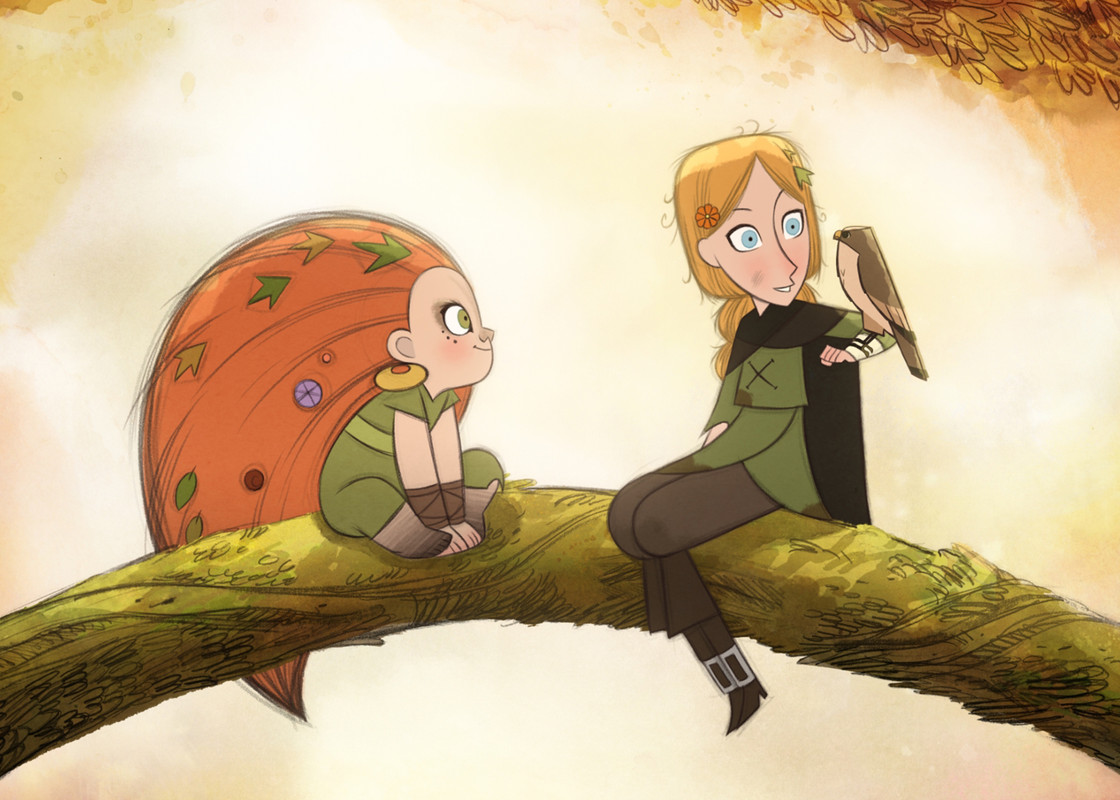Dir: Tomm Moore /Ross Stewart
As children, my brother and I were read to every night, and in recent years I've read to friends kids. I've always believed that this fondness for being told stories is where my love of cinema comes from. Few people have ever captured the feeling and texture of those stories and of the books they were read from than director Tomm Moore and his colleagues at Cartoon Saloon.
Wolfwalkers tells what feels like an old Irish folk tale. Set against the English occupation of Ireland in the 1650s, it's about an adventurous young English girl named Robyn (Honor Kneafsey) who longs to go hunting with her father (Sean Bean), who has been charged with clearing the local forest of wolves. On a trip into the forest, Robyn is bitten by Mebh (Eva Whittaker), a young Wolfwalker who is a little girl when she's awake, but a wolf when she sleeps. The bite makes Robyn a Wolfwalker too, and she and Mebh become fast friends and together try to save the wolves and Mebh's mother (Maria Doyle Kennedy) from the Lord Protector (Simon McBurney).
The animation has two distinct styles, delineated between the town and its people and the forest and its residents. The town is all woodcut style; sharp lines and angles both on the buildings and the people. Most of them also move in a distinctly angular fashion, the massed soldiers in particular animated in a slightly jerky but regimented fashion that makes me wonder whether they are animated on twos. The more free-spirited Robyn and her father are similarly styled but move in a more fluid manner that reflects the way they are increasingly caught between the two worlds of the film. In extreme contrast, the forest is all sweeping lines and curves, visibly free brush strokes chosen over ruler-straight lines and circular imagery (Yin and Yang sometimes graphically invoked in the depiction of Robyn and Mebh) rather than sharp angles. Even without dialogue or character, the art choices allow us to immediately understand the opposing forces at play here. The bold style of the animation and the contrasting shapes and movement of the characters make the film a kinetic watch.
Action sequences later on are marked by the same differences in style choices, with the motion of the wolves feeling as graceful as it does threatening and jagged flames contrasting against the forest. Equally interesting, and somewhat distinct even from the rest of the animation, is how it depicts the way Wolfwalkers see; scent and sound are depicted as sketchy lines of colour, an impression of the real world, or something close to a storyboard in animation, giving a sense of the essential movement without fully rendering it.
All the beauty and meaning embedded in the animation is wedded to a story that is both simple and deep. There are themes here of a father and daughter finding common ground (the sequence in which Robyn begs her father not to kill the wolves is marked by some of the most striking image choices, as the black frame around the film encroaches ever more; shrinking and focusing the image). This theme of a child's love for their parent is also echoed in Mebh's search for her mother, whose human form has been trapped in sleep, leaving her unsure where the wolf part of her is. There are also themes of nature vs encroaching urbanization (the 17th century equivalent of it at least) and of how unlikely friendships can be almost as close as family. Kids likely won't analyse these layers, but without talking down to either them or adult viewers, Moore and Stewart make the ideas plain, without allowing them to overwhelm the essential storytelling.
Wolfwalkers is a beautiful film; visually stunning and meaningful on that level as well as being an enchanting piece of old-fashioned storytelling, a bedtime story that children and their parents can enjoy together and all get something out of.
★★★★½


No comments:
Post a Comment